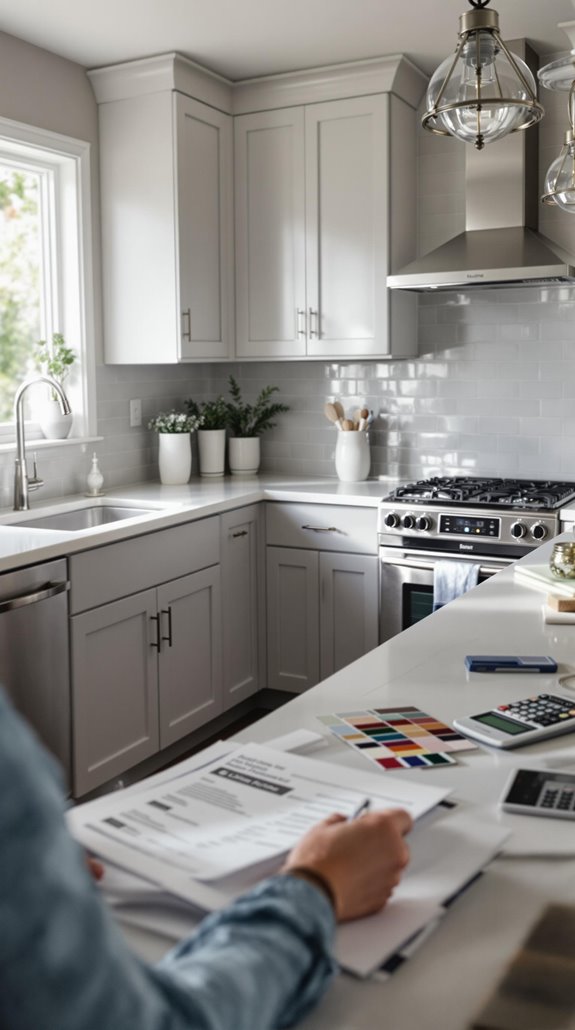I’ve watched countless homeowners make expensive mistakes when selling their renovated properties, turning what should be profitable investments into financial disappointments. You’ve poured your heart, time, and money into transforming your space, but now you’re facing a market that doesn’t always value your efforts the way you’d expect. The difference between a successful sale and a costly misstep often comes down to six critical decisions that most sellers don’t see coming.
Key Takeaways
- Don’t expect dollar-for-dollar returns on renovations; most projects yield only 60-74% returns regardless of investment amount.
- Prioritize essential repairs over luxury upgrades, as foundation and safety issues can kill deals entirely.
- Avoid over-personalization like bold accent walls, which can reduce offers by 3-5% and extend market time.
- Choose agents experienced in marketing renovated homes who understand how to price and highlight renovation value effectively.
- Invest in professional photography and video tours to properly showcase renovations and attract serious buyers online.
Don’t Let Renovation Costs Drive Your Listing Price

While renovations can transform your home’s appeal, they won’t automatically translate into dollar-for-dollar returns when you’re ready to sell. I’ve seen countless homeowners make this mistake—adding their renovation costs directly to their asking price, only to sit on the market for months.
Here’s the reality: even high-recovery projects like steel front doors only recoup 100% of costs, while most renovations yield 60-74% returns. Your $24,000 kitchen renovation? It’ll likely add only $14,400 to your home’s value. With 46% of buyers now less willing to compromise on home condition, the pressure to renovate has increased, but returns remain limited. Consider that strategic extensions can often enhance your property’s value more effectively than standard renovations.
Market conditions, not your receipts, determine your home’s worth. Consult local realtors for accurate comparables rather than calculating based on what you spent. Your renovated home competes against similar properties, not your investment total.
Focus on Essential Repairs Over High-End Upgrades
Although luxury upgrades might seem like smart investments, essential repairs deliver far better returns and faster sales. I’ve seen sellers spend thousands on gourmet kitchens that recoup only 60% of costs, while ignoring foundation cracks that kill deals entirely. A snagging survey can help identify defects or unfinished work before finalizing the sale, ensuring you address critical issues that may deter buyers.
You’ll get better results fixing what matters most: roofs, plumbing, electrical systems, and structural issues. These repairs maintain your property’s value and prevent the 20% longer market time that comes with unaddressed problems. Safety concerns trigger price negotiations 75% of the time, and appraisers dock 2-5% for deferred maintenance.
Here’s the bonus: repairs qualify for immediate tax deductions, unlike improvements that depreciate over decades. Focus your budget on essential fixes first—you’ll improve your net proceeds by 5-8% in most markets. In a buyer’s market, essential repairs become even more critical to help your property stand out from the competition.
Avoid Over-Personalizing Your Renovated Spaces

Why do 61% of buyers reject homes requiring immediate cosmetic changes? Because they want to move in without spending thousands reversing your personal touches.
I’ve seen sellers lose money on bold accent walls and custom murals that seemed perfect to them. These features reduce offers by 3-5% and extend your time-on-market by 22 days. That’s real money leaving your pocket. Additionally, regional price variations can further impact the net gains when selling a property.
Instead, I recommend neutral palettes that attract 73% more buyer interest. Skip the themed bedrooms and bespoke fixtures that scream “someone else’s taste.” Buyers can’t envision themselves in over-personalized spaces. Modern technology can help analyze user behavior patterns to determine which design elements resonate most with potential buyers.
Focus on removable decor and universal upgrades like energy-efficient windows. Your goal isn’t showcasing your style—it’s helping buyers imagine their own life unfolding in your space.
Present Your Property With Professional Marketing Materials
Professional marketing materials determine whether your renovated property attracts serious buyers or gets scrolled past in online searches. I’ve learned that quality photos aren’t optional—they’re your first impression and often your only chance to capture attention.
Invest in professional photography that showcases your renovation work. High-quality images highlight the craftsmanship you’ve invested in and help buyers envision themselves in the space. Don’t underestimate the power of virtual staging for empty rooms—it helps buyers understand how spaces function. To further enhance the appeal, consider optimizing lighting and space to create a warm and inviting atmosphere in your photos.
Your listing description should tell the renovation story concisely. Focus on key improvements, upgraded systems, and modern features that add value. Include floor plans and before-and-after photos when possible. Remember, buyers scroll through dozens of listings daily. Make yours impossible to ignore.
Consider incorporating video tours of your renovated property, as listings with videos receive 403% more inquiries than those without.
Choose the Right Agent for Renovated Home Sales

How do you find an agent who truly understands the unique challenges of selling a renovated property? Start by seeking agents with proven experience marketing upgraded homes in your neighborhood. They’ll know how to price your improvements correctly and highlight renovation value to buyers. Additionally, they should be familiar with key renovations that significantly enhance a property’s appeal.
Look for agents who can articulate a clear marketing strategy for your specific upgrades. They should understand which renovations add value and how to position your home against comparable properties.
Check their recent sales history with renovated homes and ask for references from similar sellers. A quality agent will provide detailed market analysis and communicate transparently about pricing strategies. Speaking with previous clients offers insights into how well the agent marketed renovated properties and achieved successful outcomes.
Most importantly, watch out for agents who pressure you to sign quickly. The right agent will take time to understand your renovation investment and develop a tailored approach.
Separate Emotional Investment From Market Reality
Finding the right agent sets the foundation for success, but your emotional attachment to renovation work can quickly derail even the best marketing strategy. You’re not alone in this struggle—only 31% of sellers stay calm and collected during the process, compared to 42% who felt composed when they originally bought their home.
Your emotional investment can delay your moving timeline and cloud your pricing judgment. When you overprice based on memories rather than market value, you’ll weaken buyers’ emotional connections and invite unwanted scrutiny. Properties with emotionally attached sellers spend 10-20% longer on the market. Understanding market analysis is crucial for pricing your home effectively.
I recommend depersonalizing your space and seeking input from trusted professionals. Focus on your future goals rather than past investments to reduce emotional burden by 25%. Emotional attachments can lead to irrational decision-making that undermines your entire selling strategy.
Conclusion
I’ve walked you through the key mistakes that can derail your renovated property sale. Don’t let your emotional attachment cloud your judgment—stick to market-driven pricing, focus on essential repairs, and keep your design choices neutral. Invest in professional marketing materials and choose an agent who understands renovated homes. Apply these strategies, and you’ll maximize your return while avoiding costly missteps that trip up most sellers.
References
- https://www.marthastewart.com/costly-mistakes-owners-make-when-selling-their-home-zillow-survey-11762511
- https://www.windermere.com/blog/biggest-home-buying-and-selling-mistakes-and-how-to-avoid-them
- https://resimpli.com/blog/home-selling-mistakes/
- https://behindthehedges.com/real-estate-roundtable-sellers-avoid-mistakes/
- https://www.hommati.com/blog/12-common-house-renovation-mistakes-to-avoid-for-sellers
- https://www.nar.realtor/magazine/real-estate-news/sales-marketing/12-remodeling-projects-that-offer-the-best-value-at-resale
- https://www.jenmcfadyen.com/imjenblog/how-renovations-impact-your-homes-value
- https://www.nar.realtor/research-and-statistics/research-reports/remodeling-impact
- https://www.southalabama.edu/colleges/mcob/news/home-renovation-statistics.html
- https://www.nari.org/NARI/media/Assets/2025-Remodeling-Impact-Report_Final-4-9-25.pdf

